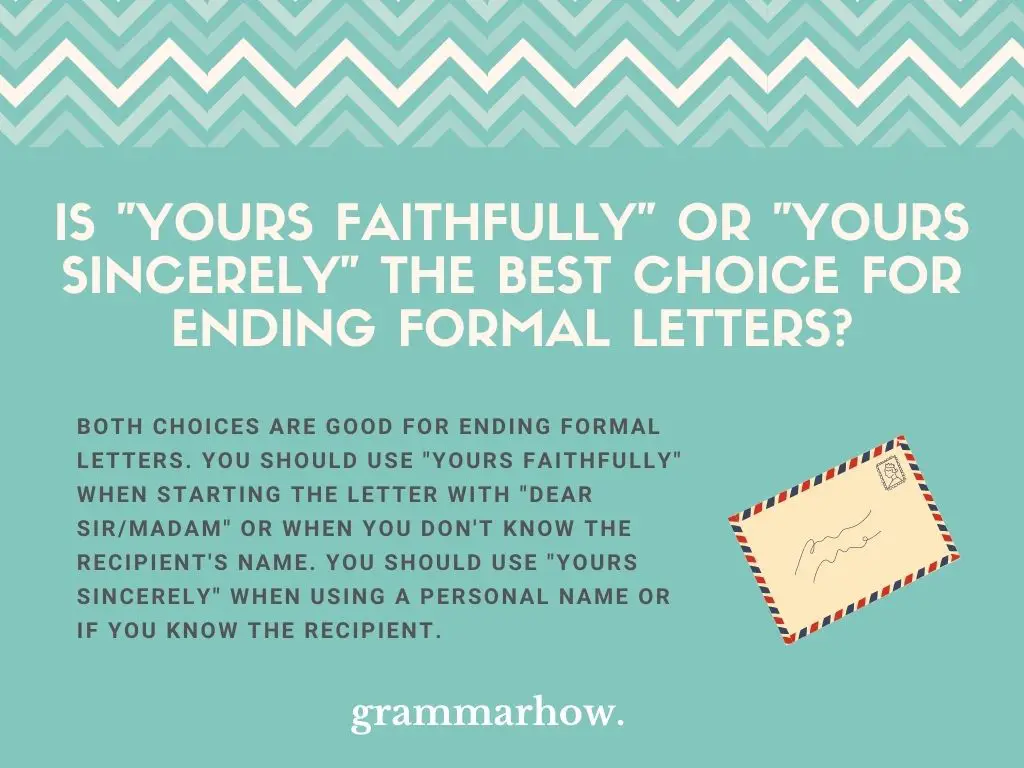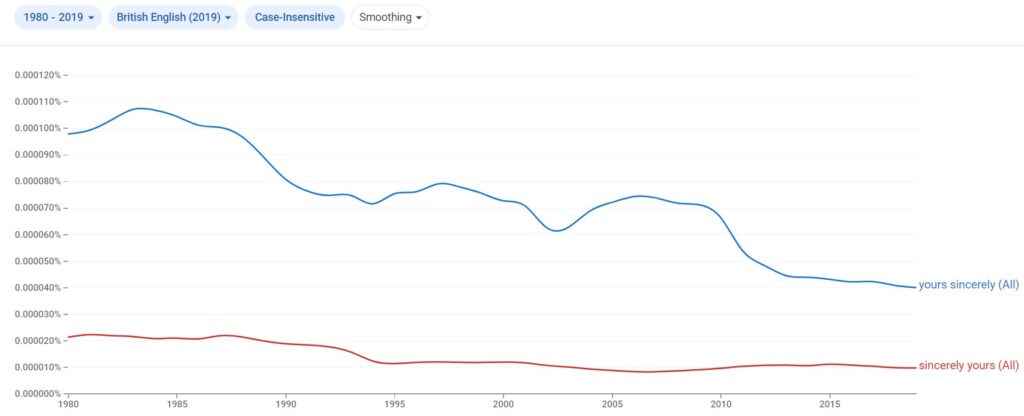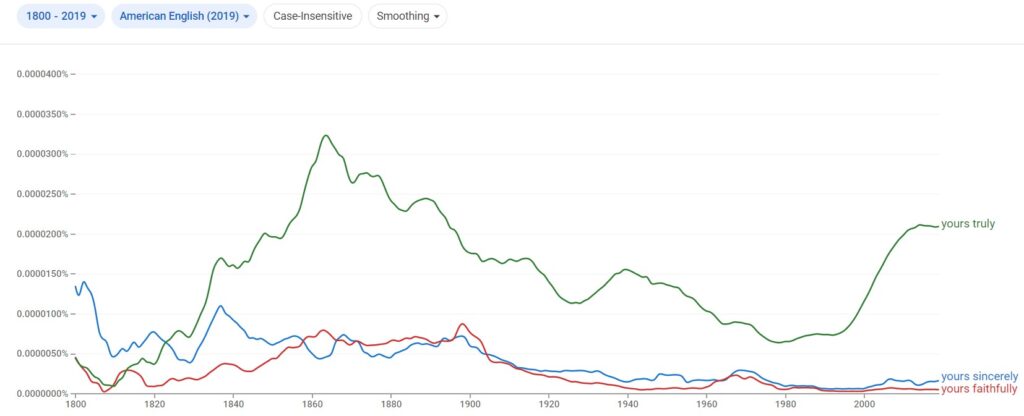When signing a letter, you can use a few options to end it. “Yours faithfully” and “yours sincerely” are two such options, and this article will look at which is best in formal letters. There are certain rules to follow when using both, so we’ll cover those as well.
Is “Yours Faithfully” Or “Yours Sincerely” The Best Choice For Ending Formal Letters?
Both choices are good for ending formal letters. You should use “yours faithfully” when starting the letter with “dear sir/madam” or when you don’t know the recipient’s name. You should use “yours sincerely” when using a personal name or if you know the recipient.

We refer to both of these statements as “complementary closes.”
They are present at the end of almost every formal email or letter, and we use them to close off before writing our name. Both are correct, and it only depends on how well you know the person you’re writing a letter to that determines which of them you should use.
When To Use “Yours Faithfully”
We’ll start by going through how “yours faithfully” works.
You should use “yours faithfully” when you don’t know the name of the recipient of your letter. Instead, you’ll write “dear sir” or “dear madam” to address them, meaning you “faithfully” sign off at the end.
We use “yours” here to show that we’re pleased that they’ve allowed us the time to read our letter. It means “this is now yours” and works well to show formality in most cases.
You might see “yours faithfully” in the following ways:
- Dear sir,
- I hope this letter finds you well, as I have much to share with you.
- Yours faithfully,
- Mr. Tidings
- Dear ma’am,
- I am writing this letter to share my displeasure with you, and I hope you will read the contents thoroughly.
- Yours faithfully,
- Mrs. Simmons
- To whom this may concern,
- I hope my letter reaches you well. It has been brought to my attention that my concerns raised in the previous meeting have yet to be addressed.
- Yours faithfully,
- Harry Hubert
“Sir,” “madam,” and similar titles are correct to use in this case. We do this when we’re not sure who might receive the letter or want to keep our formalities appropriate.
We can also use phrases like “to whom it may concern” when we have no idea who is going to receive our letter. “Yours faithfully” still applies in these cases, too.
When To Use “Yours Sincerely” And “Sincerely Yours”
“Yours sincerely” works when we do know the name. Some people also sign it backward and use “sincerely yours,” though this isn’t a common trope.
You should use “yours sincerely” when addressing someone by their name or with a personal title. Addressing some like “Mr. Smith” or “Daniel Webster” are appropriate times to use “yours sincerely” at the end of your letter.
Whether we only know the surname or the full name doesn’t matter. As long as we know an element of their personal name, we are able to use “yours sincerely” to sign off the letter.
The content of the letter will be much the same as what you can expect from “yours faithfully.” Nothing changes in the contents. It’s simply related to who you address and whether you’re familiar with them.
Some examples might help to make sense of this:
- Dear Mr. Jackson,
- I hope this letter finds you well. I’m more than happy to take you on board as a new client.
- Yours sincerely,
- Freddy Jones
- Dear Jackie Paulson,
- I am writing this letter to tell you all about the discoveries I made when I was abroad.
- Sincerely yours,
- Mr. Tomkins
- Dear Mrs. Harrison,
- I am writing a letter to you now to ask that you reconsider your decision before the council meeting!
- Yours sincerely,
- Milo Mikkelson
“Sincerely yours” and “yours sincerely” are interchangeable. As long as we address the recipient by name, we can use either closing statement to end our letter.
It’s much more likely that you’ll see “yours sincerely” at the end of a letter than “sincerely yours.” Most native speakers put “yours” first because it stays more in line with other phrases like “yours faithfully” and “yours truly.”
Is It Right To Say “Sincerely Yours”?
There is nothing wrong with using “sincerely yours” in your letters, even though it’s not the most common choice for native speakers.
It might help to look through common usage across American and British English. Sometimes, this helps us to understand whether the phrase is worth learning at all.
According to Google Ngram Viewer, “sincerely yours” and “yours sincerely” are used almost identically in American English. However, neither phrase is particularly popular, as you can see from the rapid decline over the last 200 years.

According to Google Ngram Viewer, “yours sincerely” is much more popular in British English, and it’s rare that British speakers will ever use “sincerely yours” in their letters or emails.

While American English doesn’t have a preference between the two, British English clearly favors “yours sincerely.”
The exact reason why this is the case is unclear, though it’s taught that “yours sincerely” is the only correct option in British schools. American English like to sway away from standardized rules, so they might have introduced “sincerely yours” as their own unique language construct.
When To Use “Yours Truly”
There is another option that we haven’t covered yet. “Yours truly” is a fairly popular phrase, and seeing how we use it in different languages will show you why.
According to Google Ngram Viewer, “yours truly” is vastly more popular than both “sincerely” and “faithfully” in American English. That’s because “yours truly” is the equivalent of “yours faithfully” to most American English speakers.

According to Google Ngram Viewer, “yours truly” is still more popular than the other two choices but much less popular overall in British English. It seems that all three phrases are used almost to the same degree, and British English has no particular preference.

You should use “yours truly” when you do not know the name of the recipient of your letter, just like “yours faithfully.” However, it’s much more likely that you’ll come across this in American English rather than British English.
Some examples might help you to understand it better:
- Dear sir,
- I hope this letter reaches you in time, as what I have to say is of high value.
- Yours truly,
- Madam Lopez
- To whoever receives this letter,
- I hope that I’m not out of line here, but I have many issues that I’d like to raise before the next government meeting.
- Yours truly,
- Mr. Harper
- Dear sir/madam,
- I am writing this formal letter to criticize the abysmal performance of the staff I’ve noticed in your establishment in recent times.
- Yours truly,
- Karen Sinister
Why Is It “Yours Faithfully” And Not “Your Faithfully”?
So, why do we use “yours” in the phrase? We could just as easily use “your” since we’re only talking to one person, right?
You should use “yours” because it’s addressing “your” in the possessive form, meaning that the recipient now owns the contents of the letter. “Your” isn’t the possessive form, meaning it doesn’t make any sense to sign off in this way.
Does This Rule Also Count For “Yours Truly” And “Your Truly”?
The same rules apply no matter what way you choose to sign off your letters.
“Yours truly” is the only correct way to sign off because we need to use “yours” as the possessive form. There are no cases where “your truly” is correct to use.
Synonyms For “Yours Faithfully” And “Yours Sincerely”
While “yours faithfully” and “yours sincerely” are great ways to end a letter, there are still plenty of synonyms out there. We’ll include a good number of them, and we’ll finish off this section by telling you whether any of them are better to use than the original two.
- Best wishes
- Kind regards
- Kindest regards
- Regards
- Respectfully
- Best regards
- Yours truly
The best options are “yours faithfully” or “yours truly” when you don’t know the name of the recipient and “yours sincerely” when you do know it. In formal writing, these are the only options you should consider.
With that said, we’d like to point out that “kind regards” is a great formal choice, but we mostly use it in emails. You’ll rarely (if ever) see it used in a letter, so you should avoid doing so.
Also, if you’re looking for informal options, we believe “best wishes” is your best choice. It’s a great way to sign a letter or email for someone that you know and trust, and you don’t mind too much about the professional tone of the letter.
Of course, you’re free to use whichever of the synonyms you prefer, but there really is no comparison worth being made over “yours faithfully,” “yours truly,” or “yours sincerely.”
You may also like: 12 Better Ways To Say “Sincerely” In Formal Emails
Final Thoughts
“Yours sincerely” and “yours faithfully” are great ways to end a formal letter and work based on whether you know the name of the recipient or not. “Yours truly” is another valid option, but you should stick to one of those three in all cases regarding formal letter writing.

Martin holds a Master’s degree in Finance and International Business. He has six years of experience in professional communication with clients, executives, and colleagues. Furthermore, he has teaching experience from Aarhus University. Martin has been featured as an expert in communication and teaching on Forbes and Shopify. Read more about Martin here.
